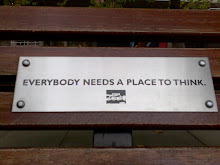
I was standing at the nurses' counter, writing into my patient's case notes when I observed an encounter between two nurses: one was a Staff Nurse (SN), and the other was an Enrolled Nurse (EN). (For those who don't know, SN rank higher as they graduate from Polytechnics while EN graduate from ITE.)
Apparently the EN did not record on paper that a patient had opened his bowels. The SN asked her with obvious frustration, 'You knew that he did it. Why didn't you record it??' The EN immediately said, 'I did. I wrote it this morning!' But as she said that, she looked for one moment, extremely confused as to why the SN asked her that question; and at another moment, she appeared unsure as to whether she actually recorded it.
The SN couldn't see her expression because she had her back facing the EN. If she did, she'd have seen that the EN was obviously unsure if she's recorded it down. While the EN was trying to recollect what happened that typically-frenzied morning at the ward, the SN sniped at her with a sarcastic, scathing tone, 'If you didn't do it, just say you didn't do it. Why do you need to pretend? Don't pretend that you wrote when you didn't.'
It was quite frankly a bit*y encounter that I didn't expect from nurses. I realised I might have held on to a stereotype notion of how nurses are: gentle, kind, sweet, patient. Truth is, the nursing profession is hierarchical and bullying does occur. Ward Sisters are the 'big bosses' of the ward. Some are very nice but some can be very demanding and strict. I know of nurses who are secretly scared of their ward sister because they are frequently scolded by her. Once I witnessed an experienced sister scolding a less experienced sister like how a parent would chide to teach a child a lesson. There are even some nurses who call their ward sister "Mummy"!
I wonder why such power relationships take place. It's one thing to have an unequal relationship with someone more senior in your job, but it's another for that relationship to be one of superiority and nastiness. This phenomenon is not any reflection of our Asian culture; it occurs in other non-Asian countries as well. This nurse calls it "horizontal violence" and attributes it to their "lack of autonomy, accountability and control over their profession". I wonder if there are other healthcare professions that might be like that. I know for sure (so far at least) that my department isn't like that at all.












